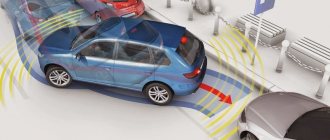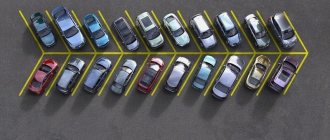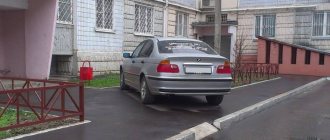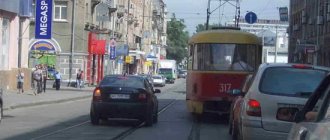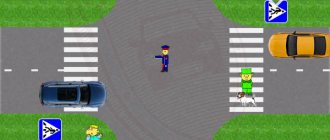Legislative basis for parking benefits for people with disabilities
The Federal Law “On Social Protection of Disabled Persons in the Russian Federation” dated November 24, 1995 No. 181-FZ obliges parking lot owners to allocate parking space specifically for people with benefits.
According to current standards, such spaces must be at least 10% of the total number of parking spaces. There may also be regional legislation that specifically indicates the availability and content of certain parking benefits. In the case of Ryazan, this is the decision of the Ryazan City Duma No. 267-II dated December 26, 2013 “On approval of the procedure for the creation and use of parking lots (parking spaces) located on public roads of local significance of the municipal formation - the city of Ryazan.”
Who does the sign apply to?
All designated parking spaces for people with disabilities must be marked with a special “Parking for the Disabled” sign.
They can be used:
- disabled persons of the first and second groups;
- citizens who transport adults or minors with disabilities.
Persons with group 3 disabilities do not have the right to use such parking spaces, regardless of the fact that they receive a disability pension.
At the same time, a sticker on the glass of a vehicle, on the one hand, is not at all necessary to indicate status, and on the other hand, it cannot in any way officially confirm that a disabled person is in the car.
The driver, whether a citizen of the first or second group, or simply the driver transporting him, in order to use a special parking space must have documents that confirm this right, namely:
- Certificate of incapacity for work.
- Certificate from a medical institution confirming incapacity for work.
Typically, such cars are equipped with special stickers located on the windshield or rear window to alert other road users that a person with a disability is in the car.
But only a certificate of disability can confirm that the sign was placed legally.
Parking benefits for disabled people in paid parking: who is eligible?
In most cases, disabled people of groups 1 and 2 have the right to benefits. In some regions, benefits are provided to all categories of citizens with disabilities. In this case, it should be understood this way: benefits can be used by drivers directly driving a vehicle (if it is registered as the property of a disabled person), and drivers of cars transporting disabled people (including disabled children).
The law requires the obligatory placement of a “disabled person” badge on a car, but, for example, in those places where the registration is automated (a car is driven with a special device), the license plate number of the car is read and then compared with the database. The sticker will not play a role in this case.
Benefits are issued according to the formula “one disabled person = one car.” In some regions (residential areas of Moscow), permission is issued not for each person, but for one apartment.
We described in detail the procedure for challenging fines for paid parking in an article on our website here.
We suggest you read: How to properly terminate a contract? step-by-step instruction
Moscow Government Decree No. 289-PP establishes paid parking within the approved parking zones. An exception was provided for certain categories of vehicles, which include vehicles driven by disabled people or intended to transport them.
By law, any parking lot must allocate at least 10% of the spaces to people with disabilities, which they have the right to use free of charge.
Parking lots located in close proximity to:
- hospitals,
- hospitals,
- social institutions,
- sports and rehabilitation complexes,
are required to allocate at least 20% of places to people with disabilities.
Only disabled people. It is prohibited for other vehicles to park in the spaces allocated to them, including those entitled to free parking.
General rules for organizing paid parking
The territory where paid parking is organized is indicated by road signs and road markings, and must also be equipped with an automated payment system in cash or non-cash form (Part 5, Article 13 of Federal Law No. 443-FZ of December 29, 2017
).
Parking lots that are not marked with appropriate signs are free.
The law of a constituent entity of the Russian Federation may prohibit paid parking in areas directly adjacent to sports facilities, buildings housing educational organizations, medical organizations of state and municipal healthcare systems, cultural organizations, government bodies, local governments and organizations providing state and municipal services, as well as on land plots related to the common property of apartment buildings (Part 2 of Article 13 of the Federal Law of December 29, 2017 No. 443-FZ
).
The right to free use of paid parking can be granted both by the legislation of the Russian Federation and by the legislation of a constituent entity of the Russian Federation. The owner of paid parking has the right to establish additional categories of persons, categories of vehicles who are granted the right to free or preferential use of paid parking (Part 9, Article 13 of Federal Law No. 443-FZ of December 29, 2017
;
clause 2 of the Moscow Government resolution No. 289-PP dated May 17, 2013
;
clause 2.1 of the Order of the Department of Transport and Development of Road Transport Infrastructure of Moscow dated 08/01/2019 No. 61-02-343/9
(hereinafter referred to as
Moscow Order No. 61-02-343/9
)).
Let's consider the rules for using city parking lots when placing a car in Moscow, with the exception of cases where you have a resident parking permit.
Penalty for parking in a disabled space
For illegal parking, the fine will be 5,000 rubles.
A vehicle that occupies such a space without reason will be subject to detention. The car is towed to the impound lot, which will entail another payment in the amount of several thousand rubles. The cost depends on the tariffs in force in the region and on the time the car is in a specialized parking lot.
According to the rules for arranging parking lots, including parking lots in the courtyard of an apartment building, it is mandatory to provide free parking spaces for disabled people, and such spaces must be at least ten percent of the total number (Article 15 181-FZ).
Most often, an area for cars with disabilities is set up closer to the exit and is marked with special markings and appropriate signs.
The rules do not establish where exactly such zones should be located and exactly how many parking spaces there should be; each owner has the right to determine their number, the main condition is that their number should not be below the established minimum level.
According to Art. 15 of Law No. 181-FZ “On Social Protection...” dated November 24, 1995, each organization, regardless of its organizational and legal form, is obliged to provide persons with disabilities with unhindered access to the facility. The same rule applies in public transport.
Violation of these requirements, according to Art. 5.43 of the Code of Administrative Offenses of the Russian Federation entails administrative liability in the form of a fine:
- for officials the fine ranges from 3,000 to 5,000 rubles;
- for organizations, the fine has been increased to 30 thousand - 50 thousand rubles.
Not every person with disabilities is able to get behind the wheel of a car independently. Most often, they are transported by special vehicles, or they use the services of a taxi or relatives or friends.
Basic parking rules in the article:
We suggest you read: How long can debt collectors call under the new law?
"Parking Rules"
Read what the parking fines are here.
When transporting such people, vehicle owners have the right to install a special sign on their car and use parking spaces for disabled people for parking, but only if the passenger has a document that confirms his status.
If these requirements are not met, the violator will be fined or other types of punishment will be applied to him.
Table 1. Types of penalties for violating parking rules for disabled people.
| Violation | Type of punishment |
| Unauthorized use of a special sign | 1. For a vehicle driver - a fine of 5,000 rubles and confiscation of the sign 2. For an official - a fine of 20,000 rubles 3. For legal entities - a fine of 50,000 rubles |
| Violation of parking rules in spaces for disabled people by a car transporting a sick person, but not equipped with a sign | 800 – 1,000 rubles |
| Equipping a car with a special sign in the absence of permits | 5,000 rubles |
Cost of paid parking in the capital from 2021
The increase in cars in the metropolis entails the problem of their location in specially organized places. If this issue is not acute in the outskirts, then in the center local residents especially suffer from it. The mayor of the city considered that the decision by increasing tariffs would free up 20% of the places, so in particularly crowded places the maximum amounts will apply, which will not be canceled on weekends.
Parking costs in Moscow
Maximum parking fee
The maximum tariff will be valid only from 8 to 21.00 and will affect about 2% of Moscow streets. Including Moscow City, Patriarch's Ponds, st. Tverskaya, Neglinnaya, Arbat, Romanov Lane. At night the fee is 200 rubles. The amount does not change on weekends, but will remain free on public holidays.
Map of the cost of paid parking in Moscow
Parking costs vary depending on street congestion.
The most budget-friendly areas will be parking between the Garden Ring and the Boulevard Ring. The daytime tariff will be 80 rubles/hour. But on the busiest streets of the Garden Ring they will make differentiated payments, where for the first 30 minutes the driver will pay 50 rubles, and then 150 hourly. Inside the Boulevard Ring the amount varies from 100 to 200 rubles.
Parking cost map
Between Sadovoy and the Third Transport Ring, prices will remain unchanged.
Procedure for applying for parking benefits
To apply for benefits, you must submit a corresponding application to the MFC; a number of regions make it possible to submit documents through the STATE SERVICES website.
If a disabled person applies, the list includes the following papers:
- application for entry into the Register of entries/information;
- passport;
- vehicle registration certificate;
- document on disability;
- insurance certificate of compulsory pension insurance of the applicant (SNILS).
If a person applying for benefits for transporting a disabled child applies:
- birth certificate;
- passport of his legal representative;
If the documents are drawn up by a legal representative, then:
- his passport;
- document confirming authority.
Compared to public parking spaces, parking spaces for disabled citizens are arranged somewhat differently.
This is understandable: many people use wheelchairs and they must have a place both for unloading it from the car and for further travel between vehicles.
Typically, all parking spaces are located one after the other, this is both more convenient and allows you to increase the distance between two cars, which increases the possibility of maneuver.
The special marking is a copy of a road sign painted on the asphalt with yellow paint. Parking for disabled people is designated according to traffic regulations using special markings and a “Parking for disabled people” sign.
At the same time, a sign is installed next to such a sign, notifying that this zone is intended only for parking cars of persons with disabilities, or for parking vehicles transporting such citizens, including special vehicles.
The owner considered guest parking a violation of the law
A resident of an apartment building appealed to the Supreme Court of the Russian Federation to challenge the legality of the owners’ right to arrange guest parking in the local area.
Guest parking is considered to be open areas intended for cars of visitors to residential buildings. Their arrangement is allowed. clause 2.3, 2.10 SanPiN 2.1.2.2645-10:
- the land plot allocated for the construction of apartment buildings must provide for the possibility of organizing the adjacent territory, including the placement of guest parking for vehicles;
- It is prohibited to place any trade and catering establishments, as well as parking lots, except for guest ones, in the courtyards of residential buildings.
Disagreeing with this approach to organizing the local area of the apartment building, the owner tried through the court to declare these points of the Sanitary Rules and Standards partially ineffective.
The plaintiff stated that the guest parking lots organized in the courtyard are actually used by residents to permanently park their cars. At the same time, parking is organized without gaps between parking spaces and the facade of the house and children's playgrounds. The absence of breaks violates the requirements for air quality and noise levels in residential areas.
Organized guest parking in the yard, according to the plaintiff, violates the rights of citizens to favorable living conditions and protection from the negative effects of the environment (Article 8 No. 52-FZ, paragraph 1 of Article 11 No. 7-FZ). Cars left in the immediate vicinity of a residential building also violate the requirements for anti-terrorism security of the housing stock and citizens, set out in No. 35-FZ.
How to use the public parking near the house
129750
Documentation
Since 2021, the rules for installing a “Disabled Person” sign on a vehicle have changed; this has become possible only after receiving a disability certificate.
Also, you can take advantage of free parking or other benefits provided to citizens with limited mobility only if you have such a certificate.
This tightening of requirements is due to the fact that some motorists illegally use the sign when trying to leave their car in parking areas for disabled citizens.
In addition to specially equipped parking spaces, persons with disabilities or their representatives have the right to ignore certain road signs.
We suggest you read: When can collectors call according to the law?
Namely:
- Vehicle movement is prohibited; Figure 1. Sign 3.3 “Vehicle movement is prohibited”
- Parking is prohibited (Fig. 2); Figure 2. Sign 3.28 “Parking prohibited”
- Signs 3.29 and 3.30, parking on odd (even) days is prohibited (Fig. 3). Figure 3. Sign “Parking on odd (even) days is prohibited.
All these rules apply to citizens who transport disabled people in their cars, but the requirement to have the necessary documents on hand also applies to these cars.
The legislator determined the period for reviewing documents within 10 days. It is during this time that the response from the MFC will come.
Legal justification for the organization of paid parking and the rules for their use in Moscow
Paid stops in specially organized places in the capital are regulated by regulations adopted by the city authorities.
The main document is Moscow Government Decree No. 289-PP dated May 17, 2013 “On the organization of paid city parking in the city of Moscow” (with amendments and additions). In it you can find a territorial division of payment by region.
Appendix 2 contains the basic rules for using city parking lots, including how these rules apply to preferential categories. For example, disabled people can park their vehicles only in specially designated areas.
But if such a driver also falls under the “resident” category, then the parking rule also applies to him in regular areas of the site.
Offenses regarding parking non-payment fall under the law of November 21, 2007 N 45 “Moscow City Code on Administrative Offences” (as amended and supplemented).
Art. 8.14 determines administrative punishment in the form of collection of funds in the amount of 5 thousand rubles.

